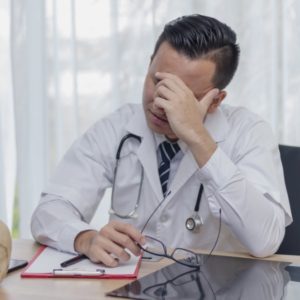Five Signs Your Doctor May Be Liable for Medical Malpractice

Medical malpractice is a serious medical threat and impacts thousands of people every year in New Jersey. When you go to a doctor or hospital, you expect the medical provider to diagnose and care for your illness or disease properly so that you can return to good health. However, there are times when a doctor, nurse or hospital may not provide you with the appropriate level of care necessary to treat your condition. Here are five signs your doctor may be liable for medical malpractice in New Jersey.
Diagnosis Delays
One of the most common ways doctors face medical malpractice liability is due to a delayed diagnosis. This is especially when the delay negatively impacts your health and your chances for a complete recovery. Some medical issues do take time to diagnose but others should be relatively clear from the onset. Medical standards require a doctor to consider the most likely potential causes for your condition. In addition to eliminating each one starting with the most serious and potentially life-threatening condition. The name for this is a differential diagnosis. It is essentially a medical process of elimination.
Unfortunately, many doctors, including experienced doctors, jump right to quick conclusions and diagnose a condition without thinking about the other potential causes. For example, immediately diagnosing someone with the flu during flu season just because they came in with a fever, vomiting and abdominal pain without eliminating appendicitis, a gallbladder attack or some other serious abdominal condition. In other cases, it might be just a careless mistake that causes the delay. For example, filing away a positive mammogram test without notifying the patient that the test was suspicious for cancer. And, without doing any further workup. When these delays cause injury or a lost chance at recovery, it is malpractice.
Complications From Surgery
Complications can also lead to medical malpractice liability. Most malpractice during surgery stems not from complications that can arise during surgery, but rather, from the failure of the surgeon to recognize and fix the complication during the procedure. For example, a doctor may nick an artery or intestine during abdominal surgery. In many cases, that may not be negligence since adhesions and scarring inside our bodies can lead to those injuries even when the best of care is used. However, failing to recognize and correct the errant cut, is almost always malpractice. This is especially if the delay causes death, serious injuries, or additional surgeries. If a surgeon operated on the wrong area of your body or performed surgery on you unnecessarily, your doctor could also be liable for medical malpractice.
 Constantly Dismissed
Constantly Dismissed
Has your doctor continuously dismissed you when you asked questions after complications arose from your procedure? Does he or she disregard your concerns? If so, this could be a sign that you are a victim of medical malpractice. A caring physician ought to listen to your concerns. In addition to making sure you are sent to other specialists if you did not have a good result. If you have that “gut” feeling that something went wrong and that it is being covered up, chances are, you are right. Don’t be a victim twice, and always seek out a second opinion. If you do not get answers and your complaints are ignored, you should immediately see a specialist on your own to get to the bottom of what happened.
Errors with Medication
Errors with medication can occur at the doctor’s office, in the hospital, or at home. For example, a doctor might prescribe you a drug that triggers an allergic reaction because he failed to consider other interacting medicines or conditions. In some cases, a doctor might prescribe the wrong dosage leading to complications or incomplete treatment. In a hospital setting, medications are sometimes given by accident, intending the drug for another patient or intending a different drug be given to you. These drug mistakes can become deadly in the wrong patient and can lead to a medical malpractice claim.
Emergency Room Errors
When your life is on the line, and there is no margin for error, you need your emergency medical providers to focus and to provide the very best of care. Unfortunately, this does not always happen.
Common emergency errors include but are not limited to failure to diagnose:
- Strokes;
- Heart attacks
- Appendicitis
- Infections.
The key to receiving excellent emergency room care is to make certain that they hear all of your complaints. And, that you give a comprehensive and accurate medical history to the emergency room doctors. The more information the doctors have, the better chance you have. If need be, call your primary care provider. Have them speak to the emergency team, since your PCP often knows your medical history and can assist in the diagnosis.
Are You a Victim of Medical Malpractice in New Jersey? Speak with an Attorney Today
Victims of medical negligence are well within their rights to file a medical malpractice lawsuit against a healthcare provider. It is in your best interest to speak with an experienced medical malpractice attorney in New Jersey about what went wrong. The team from Rossetti & DeVoto, PC can review your medical records, investigate what went wrong, and help you recover compensation for your injuries. Call our office at (844) 263-6260 to schedule a consultation.

 Constantly Dismissed
Constantly Dismissed







